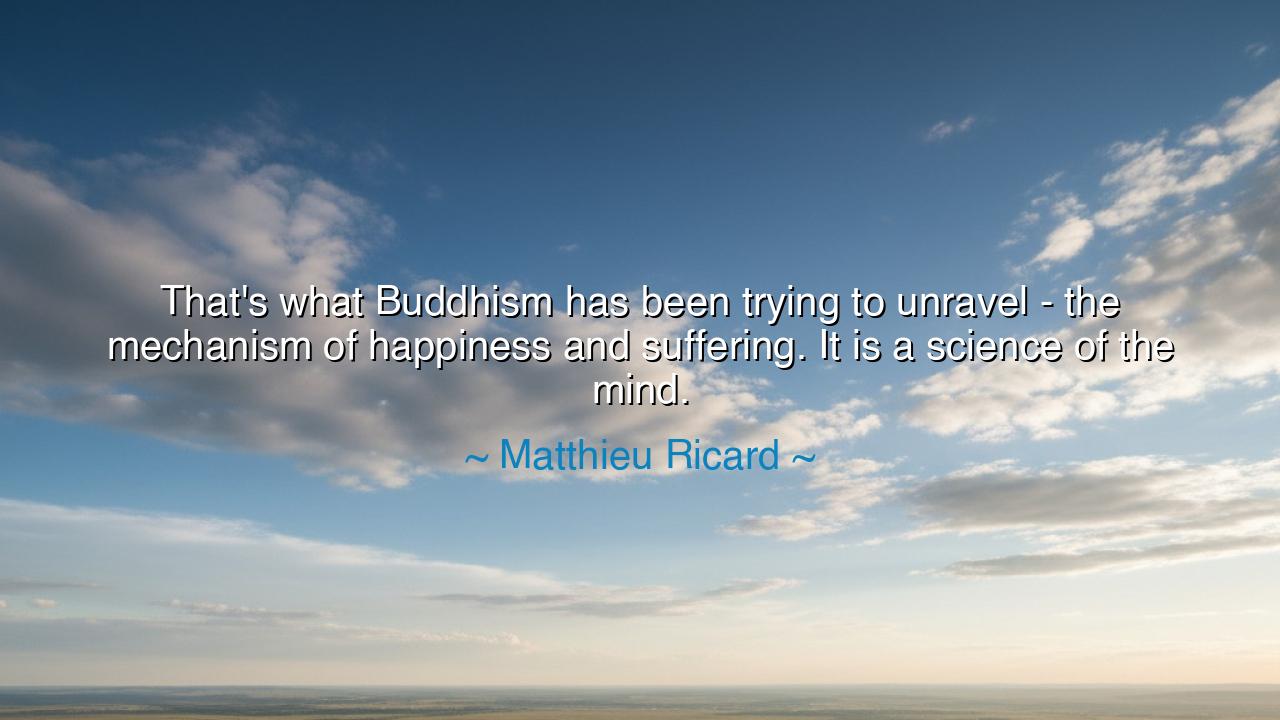
That's what Buddhism has been trying to unravel - the mechanism
That's what Buddhism has been trying to unravel - the mechanism of happiness and suffering. It is a science of the mind.






The words of Matthieu Ricard, “That’s what Buddhism has been trying to unravel—the mechanism of happiness and suffering. It is a science of the mind,” open the gate to a wisdom both ancient and eternal. In this saying lies the quiet majesty of a teaching refined through centuries of contemplation. It reminds us that Buddhism is not merely a faith of rituals and prayers, but a profound exploration of the mind, a sacred inquiry into why we rejoice and why we despair. The sages of old did not seek happiness in wealth, fame, or power; they sought to understand the very mechanism by which joy and sorrow arise within the heart. For what use is it to command the world if one cannot command one’s own thoughts?
In the earliest days, beneath the shadow of the Bodhi tree, Siddhartha Gautama, who became the Buddha, turned his gaze inward. He did not battle monsters nor climb mountains of flame. His war was subtler and mightier: he confronted the illusions of the mind itself. He sought to see clearly the chain that binds all beings—the craving that gives birth to suffering, the ignorance that blinds, the attachment that enslaves. And when he beheld their nature, he saw that freedom was not the conquest of the outer world but the liberation of the inner one. In this revelation, Buddhism became the oldest science of consciousness, long before any laboratory or microscope could measure the flicker of thought.
This science of the mind is not a study of numbers or matter, but of perception, emotion, and awareness. The ancients did not dissect the brain—they listened to the heart. Through meditation, they observed the rising and falling of thoughts like waves upon a shore. They learned that happiness is not something granted by fortune or denied by fate—it is the result of clarity, the quiet knowing that nothing external can truly disturb the mind that understands itself. Thus, the Buddhist path became both philosophy and experiment: a lifelong observation of one’s own consciousness, a pursuit of truth through experience, not belief.
Consider the life of Matthieu Ricard himself, a man of both worlds—trained as a scientist in the laboratories of France, yet drawn to the monastic silence of the Himalayas. He left behind the instruments of modern science to dwell among the masters of an older, subtler discipline: the science of the soul. For years he meditated, not to escape life, but to understand it. When neuroscientists later measured his brain, they found an astonishing harmony—a radiance of calm and compassion unseen in ordinary minds. Ricard became living proof that the mechanism of happiness can indeed be known, not by wealth or pleasure, but by training the mind to dwell in awareness and love.
This teaching is neither mystical nor distant. Every person is both student and experimenter in the laboratory of their own being. Each thought, each reaction, is a thread in the web of happiness and suffering. When we grasp at desires, we tighten the knot; when we release, the knot begins to loosen. The wise learn to watch their emotions as a river passing through them—neither resisting nor drowning, but flowing in understanding. Such mastery does not come from doctrine, but from discipline—from observing, breathing, and choosing clarity over chaos, compassion over fear.
Therefore, let this be the lesson, O seeker of peace: happiness is not found, it is cultivated. It is the fruit of patient labor upon the soil of the mind. Each day, train your thoughts as you would a wild horse. Begin with stillness; let silence be your teacher. When anger arises, look at it gently and ask, “What pain hides behind this flame?” When joy visits, welcome it without clinging. Let your awareness be the sunlight that dispels the fog of confusion. In this way, the mind becomes both healer and healed.
For the Buddha’s wisdom, and Ricard’s reflection, are one and the same: freedom lies in understanding. The world will always turn with its storms and its seasons, but within you there is a place untouched by all tempests—a sanctuary of pure seeing. To reach it is not to flee the world, but to dwell in it with open eyes. This is the true science of the mind: to know the causes of suffering, to transform them into compassion, and to awaken to the unshakable peace that has always been your birthright.
Thus, dear listener, walk the inner path as the ancients did. Observe your thoughts. Guard your heart. Seek wisdom, not merely comfort. For when you learn to understand your mind, you do not merely find happiness—you become it.






AAdministratorAdministrator
Welcome, honored guests. Please leave a comment, we will respond soon